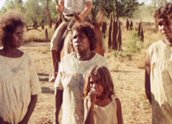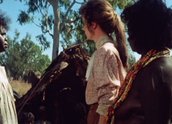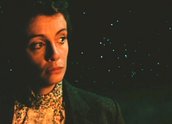


We of the Never Never (1982)
Synopsis
In 1902, Jeannie Gunn (Angela Punch McGregor) and her new husband Aeneas (Arthur Dignam) arrive in the Northern Territory to take over management of Elsey Station, a huge cattle and horse property. She battles isolation, disease and white stockmen who believe Elsey is no place for a woman. She befriends the local Aboriginal women, but is mystified by their culture. Her affection for the place and the people is tested by frequent tragedy.
Curator’s notes
We of the Never Never is based on Jeannie Gunn’s popular autobiography, published in 1908, five years after she left Elsey to return to Melbourne. The film puts a rosy gloss on Mrs Gunn’s account of her year in the outback, avoiding any reference to the 'nigger hunts’ that she wrote about (and in which her husband took part). In the film, Jeannie Gunn is an entirely sympathetic character, although her relationships with men, both black and white, provide the film with rich drama.
The film is visually lush, with thundering horses, dusty corrals and the superb colours of the outback giving romantic expression to the pioneering theme – but the problem of race is always lurking, and it is the film’s main theme. Her sympathetic approach to the blacks is never enough to solve the film’s major question – how to live together. She is shown as meddlesome as well as affectionate, a kind of lay missionary, ministering to bewildered blacks who resent her presence, no matter how sympathetic she is.
The film was made in 1981, before the Mabo decision changed the debate around land rights, but the question of ownership is already central to the film’s mindset. No one in the film talks about giving the land back, but that’s what actually happened in 2000, when the Northern Land Council purchased three of the oldest pastoral leases in the Northern Territory. Elsey Station, near Mataranka, is now Aboriginal-owned and run, for the Mangarrayi people.
Secondary curator’s notes
by Romaine MoretonBased on the book by Jeannie Gunn, We of the Never Never speaks of the frontier life of a woman who, after marrying and moving to the outback, attempts to find 'her place’ in the rugged outpost of western society. Confronted with sexism, the main character also encounters the racism that Indigenous peoples were subject to. Based on the memoirs of Mrs Aeneas Gunn (Jeannie Gunn), the term 'Never Never’ refers to the outback, and like so many Australian films set in the desert region of Australia, the country is depicted as hostile and uncompromising. It is this perspective that frames the outback as resistant to being civilized including, by implication, the Indigenous characters.
The drama of We of the Never Never is evoked through this conflict of civility and uncivilized, of the feminine and masculine, the known and the unknown. The thrashing hooves of horses, the heavy, moving mass of the cattle’s bulk, the dry heat of the land and its physical strain on the characters, creates a dynamic of movement, disrupting the normal stillness of the outback. It is in this stillness though, that the Indigenous characters are located. And it is this stillness, the true character of the country, that remains relatively mysterious and unfamiliar.
- Overview
- Curator’s notes
- Video 3 clips

- Principal credits
- Find a copy
- Comments 2
- Map
- Add your review




